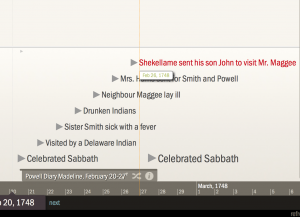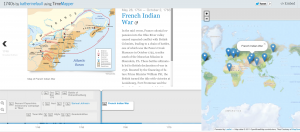Chronology is very important when studying history, as events must be placed in historical context for us to fully grasp an understanding of what occurred. Chronology helps us to understand why historical events occur, for example what led up to the beginning of a war. Grafton first points out the early significance of chronology, stating that it was a means for Christians to mark certain religious events and know when to celebrate them. He also makes the point that time is almost always associated with a line and to separate these two would be “virtually impossible.”

Not only maps useful for marking events in our history in order against time, but are also useful for plotting historical events against lunar and solar eclipses or other types of time measurements like Geradus Mercator, a now famous cartographer did. Instead of plotting time on a yearly line, historical events were plotted against eclipses that dated to the exact hour. When looking at a timeline, one can see numerous events in one picture, giving us a much bigger picture of history, instead of focusing on just one event. Both TimMapper and Timeglider are used to create visually appealing logs of events, and although they both serve as means of organizing these historical events, they portray history in different ways.

TimeMapper is used as more of a way to briefly describe larger historical events, and not give great detail, while also plotting the even on a map. It allows the observer to see where each event took place and also shows a picture relating to the historical event. For my TimeMapper event I researched the French Indian War and more specifically the Penn’s Creek Massacre. In a timegilder map of page 5 of the Powell Diary, memory is not accounted for, but only a brief series or overview of events. There is no narrative or story, but can one can see patterns, which are helpful. The Powell Diary timeglider serves as a way to view daily events and mark their significance, but the aspect of memory or perspective is not present.
Comments
One response to “The Benefits of Time Maps”
I completely agree with your statement about how TimeMapper and Timeglider both serve as means of organising historical events, yet that they can portray history in different ways. This is relatable to the idea that one set of historical information may fit TimeMapper more appropriately than Timeglider or vice versa. Moreover, the same set of historical information may illustrate different key points just by changing the mode of representation. Thus, it is very important that when dealing with historical information, we must experiment with different modes of representation in order to achieve the best aesthetic depiction, but also the one that gives us the best portrayal of the knowledgable information it contains.